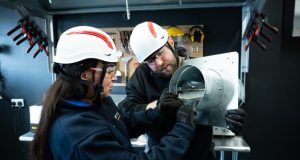Modern workplace practices such as hot-desking, working from home and increased flexibility are a win-win for employees and employers. Employees feel liberated from silos and capitalise on time recuperated from commuting, and employers can economise office space and resources. However, as a recent survey by Initial Washroom Hygiene reveals, some habits in the modern workplace may in fact carry a hidden cost: personal hygiene.
The squeeze on office space
In a survey of 2,000 UK office workers, 43 per cent reported experiencing increased pressure on the amount of office space, of whom 59 per cent reported experiencing a lack of overall work space and 48 per cent reporting a lack of meeting room space. The research showed that as a result, office workers are increasingly resorting to using washrooms to escape overcrowded offices, with 42 per cent reporting they visited the washroom simply to take a break from work.
Of course, businesses cannot always invest in more office space for staff. Office space is at a premium in the UK, which is underlined in the capital where central London office space under offer reached an 18-year high earlier this year. Instead, employers and facilities managers need to ensure their cleaning regime is stepped up appropriately to reflect increased traffic, while good hand hygiene should be promoted through signage and hand sanitation stations across the office space.
Mobile phones
By allowing people to be constantly connected, smartphones are a crucial component of our flexible working lifestyle. However, as a hard, non-porous surface that is interacted with on average 120 times per day, smartphones can also be microbe hotspots. This issue is compounded by the location in which office workers use their smartphones: 40 per cent of respondents admitted to using their smartphone while on the toilet; 30 per cent reported spending longer in washrooms since acquiring a smartphone; while only 22 per cent reported cleaning their phone after using it in the washroom.
Smartphones are a unique piece of office equipment in that we interact with them with both our hands and mouths, increasing the risk of contamination. The hard surface of a smartphone is a fantastic reservoir for bacteria and viruses which will re-contaminate even washed hands, meaning they can be easily passed around office. Germs are also easily dispersed through the air when the toilet is flushed, so a smartphone that is near the toilet when you flush is at risk of contamination.
One single bacterium can multiply into more than eight million cells in less than 24 hours. The only way to prevent smartphones from becoming incubators is by spreading awareness of the risks of smartphone use in washrooms, while promoting regular disinfection with antibacterial wipes. Businesses may wish to ban employees from taking smartphones into washrooms or can simply encourage smartphone hygiene by making antibacterial wipes readily available alongside hand sanitisers on desks.
Co-working spaces
Communal areas can become danger zones for harmful viruses during flu season, an issue which is exacerbated by the increasing amount of shared spaces in offices. Of the 855 participants who reported increased pressure on the amount of office space, two-fifths (39 per cent) reported having a hot-desking policy in place. While most offices ensure that workspaces are cleaned at the end of each day, 42 per cent of respondents believed the hygiene standards in their offices needed to improve.
It’s essential that cleaning is carried out in these areas both proactively and reactively. Proactive cleaning involves the routine disinfection of shared contact points – such as door handles, surface tops and computer keyboards and mice. With most bacteria and viruses transmissible through touch, maintaining surface hygiene goes a long way. A regular cleaning regime should be the cornerstone of a hygiene strategy, as it is a crucial step in helping to prevent outbreaks.
Reactive cleaning occurs when necessary. This could take place in response to an outbreak of illness, or when an individual presents symptoms of a transmissible infection. In this case, all areas inhabited by the individual should be thoroughly disinfected.
Final Thoughts
Flexible working is here to stay. Benefiting both employees and employers, it’s no surprise that businesses are increasingly adopting working practices to accommodate the modern-day flexible worker. However, as offices get smaller and emphasis is placed on communal  working spaces, there is a greater risk of cross contamination of bacteria within the office. To combat this, the introduction of flexible working practices should be balanced with the implementation of an effective cleaning regime to prevent the spread of bacteria and reduce the risk to employees.
working spaces, there is a greater risk of cross contamination of bacteria within the office. To combat this, the introduction of flexible working practices should be balanced with the implementation of an effective cleaning regime to prevent the spread of bacteria and reduce the risk to employees.
By: Jamie Woodhall, Technical Field Consultant, Initial Washroom Hygiene





